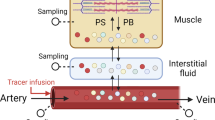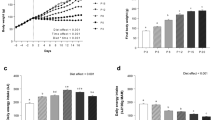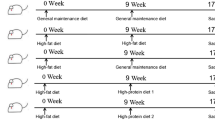Abstract
THE intensity of body and tissue protein metabolism per kg declines with increased adult body size in mammals1. This fall parallels a similar progressive decline in the intensity of energy metabolism2–4. It has also been concluded that protein metabolism per unit of body weight is about four to five times faster in young rats than in adult man1; this pattern of change extends to cellular and subcellular aspects of protein metabolism, such as plasma albumin synthesis, liver RNA content and enzyme activity1,5. Similarly, the rate of protein synthesis per kg total body weight declines during growth and development within a species, such as the rat6. This parameter again parallels the reduction in the intensity of energy metabolism which occurs during the growth period3.
This is a preview of subscription content, access via your institution
Access options
Subscribe to this journal
Receive 51 print issues and online access
$199.00 per year
only $3.90 per issue
Buy this article
- Purchase on Springer Link
- Instant access to full article PDF
Prices may be subject to local taxes which are calculated during checkout
Similar content being viewed by others
References
Munro, H. N., in Mammalian Protein Metabolism (edit. by Munro, H. N.), Vol. III, ch. 25, 133–182 (Academic Press, New York, 1969).
Brody, S., Bioenergetics and Growth (Reinhold, New York, 1945).
Kleiber, M., The Fire of Life (John Wiley, New York, 1961).
Waterlow, J. C., Lancet, ii, 1091–1097 (1968).
Young, V. R., in Mammalian Protein Metabolism (edit. by Munro, H. N.), Vol. IV, ch. 40, 585–674 (Academic Press, New York, 1970).
Waterlow, J. C., and Stephen, J. M. L., Clin. Sci., 33, 489–506 (1967).
Nicholson, J. F., Pediat. Res., 4, 389–397 (1970).
Waterlow, J. C., in Mammalian Protein Metabolism (edit. by Munro, H, N.), Vol. III, ch. 28, 325–390 (Academic Press, New York, 1969).
Sharp, C. S., Lassen, S., Shankman, S., Hazlet, J. W., and Kednis, M. S., J. Nutr., 63, 155–162 (1957).
Picou, D., and Taylor-Roberts, T., Clin. Sci., 36, 283–296 (1969).
Steffee, W. P., thesis (Massachusetts Institute of Technology, Cambridge, Mass. 02139, 1974).
Pencharz, P. B., thesis, Massachusetts Institute of Technology, (1974).
Picou, D., and Phillips, M., Am. J. clin. Nutr., 25, 1261–1265 (1972).
Sprinson, D. B., and Rittenberg, D., J. biol. Chem., 180, 707–714 (1949).
FAO/WHO, Energy and Protein Requirements, Tech. Rept Ser. No. 522 (World Health Organisation, Geneva, Switzerland, 1973).
Altman, P. L., and Dittmer, D. S., in Metabolism, p. 345, (Fedn Am. Soc. exp. Biol., Bethesda, Maryland, 1968).
Holt, L. E., jun., and Snyderman, S. E., Nutr. Abstr. Revs., 35, 1–13 (1965).
Gaull, G., Sturman, J. A., and Räihä, N. C. R., Pediat. Res., 6, 538–457 (1972).
Author information
Authors and Affiliations
Rights and permissions
About this article
Cite this article
YOUNG, V., STEFFEE, W., PENCHARZ, P. et al. Total human body protein synthesis in relation to protein requirements at various ages. Nature 253, 192–194 (1975). https://doi.org/10.1038/253192a0
Received:
Published:
Issue Date:
DOI: https://doi.org/10.1038/253192a0
This article is cited by
-
Regulation of proteasome assembly and activity in health and disease
Nature Reviews Molecular Cell Biology (2018)
Comments
By submitting a comment you agree to abide by our Terms and Community Guidelines. If you find something abusive or that does not comply with our terms or guidelines please flag it as inappropriate.



